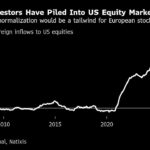
Financial markets were set to parse news that U.K. and EU leaders agreed that they should go “the extra mile” to try to find a compromise on a trade deal, following a Sunday phone conversation.
In a joint statement, U.K. Prime Minister Boris Johnson and Ursula von der Leyen, the president of the European Commission, acknowledged that “deadlines have been missed over and over” during protracted negotiations extending over the past 10 months on their future trade relationship.
Sunday had been viewed as a firm date for an agreement to occur or for a signal that a no-deal Brexit would be at hand with the Dec. 31 deadline for a pact to be struck looming.
The British pound appeared to react favorably, rising against the euro and the U.S. dollar in trade, on reports of an extension of talks.
In recent action on Sunday in New York, the pound GBPUSD, +0.68% bought $1.3308, a again of 0.6% against dollars; and a euro EURGBP, -0.52% changed hands at €1.0978, down 0.6% against the British currency.
The U.K.’s FTSE 100 UKX, -0.80%, however, may face some resistance due to sterling’s weekend strengthening.
Exporters that tend not to rely on the U.K. market, such as pharmaceutical GlaxoSmithKline GSK, -0.30% and spirits maker Diageo, have gained when negative headlines about the possibility of a trade deal emerging, while financial institutions such as Lloyds Banking Group LLOY, -4.49% have dropped.
The FTSE 100 closed Friday trade off 0.8% but was virtually unchanged for the week, but enough to snap a five-week win streak for the British bourse as hope for a deal supported some bullish buying in the past month.
Futures for U.S. stock-indexes were indicated higher as the rollout of Pfizer PFE, -1.46% and BioNTech’s BNTX, -1.73% vaccine candidate, after emergency-use authorization from the Food and Drug Administration, offered some grist for upbeat investors, overshadowing lack of progress on coronavirus fiscal relief and rising COVID-19 infections.
In fact, the viral pandemic has taken much of the spotlight away from tensions surrounding Brexit, which would otherwise be seen as a main point of risk for investors.
Prime Minister Johnson cautioned on Sunday that the two sides were “still very far apart on some key things.”
U.K. and EU negotiators have been at loggerheads on the issue of European fishermen’s rights to trawl in British waters, and on the regulatory “level playing field” by which the U.K. should abide as the price of accessing the European market.
Germany was the second-highest export market for goods for the U.K. last year, and the No. 1 source of U.K. imported goods. The Netherlands and France also were top five markets for both exports and imports for the U.K.
The total rise in barriers will shoot up to about 9% of trade volumes, both for U.K. exports to the EU, and EU exports to the U.K., according to an earlier estimate from Oxford Economics. A free-trade pact would also have resulted in more barriers, through customs administration and regulatory barriers for example, that would equal about 4.5% of current trade volumes, the economists estimated.
“The UK could negotiate with the EU all the way through the year-end and still possibly avoid a ‘no trade deal Brexit’,” wrote Citigroup researchers in a report from its CIO group, including David Bailin, chief investment officer.
“An EU trade agreement was never going to be ‘all encompassing’ and therefore definitive for the UK’s economic future. The pound could still move sharply on a ‘deal’ or ‘no deal’ event, with all the action coming fast and unpredictably,” Citi’s team wrote, in the Sunday research note.






